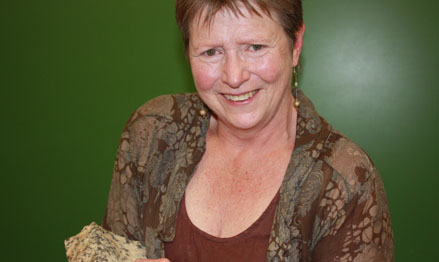Latest News Archive
Please select Category, Year, and then Month to display items
01 January 2020
|
Story Eugene Seegers
|
Photo Kaleidoscope Studios | Sonia Small
 Dr Maria Madiope took over the reins of the UFS South Campus at the beginning of January 2020.
Dr Maria Madiope took over the reins of the UFS South Campus at the beginning of January 2020.
The Council of the University of the Free State (UFS) approved the appointment of Dr Maria ‘Marinkie’ Madiope as Principal of the South Campus for Open Distance Learning (ODL) during a meeting held on 20 September 2019. Dr Madiope took over the reins of the UFS South Campus at the beginning of January 2020.
Educator at heart
Educating and empowering others are key aspects of Dr Madiope's life. She has served as the Director for University Teaching and Learning at Unisa since 2015 and takes her role incredibly seriously, achieving a transformative curriculum at the colleges under her care since her appointment.
Dr Madiope holds a PhD in Education from Unisa, with a specialisation in Didactics; her next two degrees where completed at the then RAU, which is today known as the University of Johannesburg: a BEd in 1999, followed by an MEd in 2001, both specialising in Computer-based Instruction. She previously obtained her BA Ed in 1985 and a BEd in 1988 from the University of the North. Her initial training as a teacher was from the Hebron College of Education from 1980-81.
Dr Madiope is also the editor of the only journal in ODL, Progressio, since 2016. Her expertise in E-learning is another of her strong points. Together with her team, Dr Madiope designed and developed the first online course in Curriculum Transformation, which is being piloted at Unisa. Her work has been rewarded with awards such as the Unisa Gender Activism: Advocacy and Promotion of Women’s Rights 2013, Unisa Woman of the Year 2013, and Unisa Best Performer 2013.
Dr Madiope brings with her a wealth of experience to UFS and her vision is to increase access to a wider base of learners with potentially having more African learners enrolled. The first point of call would be to have more learners coming from Lesotho and then the rest of the SADEC region, having the UFS become a leading distance-learning university. One of the key projects that Dr Madiope wishes to tackle is early childhood development. “I believe in educating educators to ensure that they are best equipped to provide the latest and relevant Early childhood and development practices that are on par with the rest of the world,” she says.
Community leader
In addition to being an experienced educator and administrator, Dr Madiope is instrumental in community projects that lie close to her heart. Whether it is large-scale advocacy for women’s rights or her personal involvement in the supply of sanitary towels for schoolgirls as part of a programme to empower the girl child through exposing them to options, it is humbling to watch her compassion in action.
She further intends to strengthen the relationship of the university with TVET Colleges and community colleges by providing mutually beneficial programmes that will up-skill those colleagues by giving them an opportunity to work with experienced UFS staff members. She says, “Reaching out to colleagues in TVET and Community colleges will offer them the opportunity to advance their lecturing and learning programmes, which will only lead to benefiting their learners and South Africa as a whole.”
Prof Tredoux turns theories regarding the formation of metals on its head
2013-09-17
|
 |
|
Prof Marian Tredoux
17 September 2013 |
The latest research conducted by Prof Marian Tredoux of the Department of Geology, in collaboration with her research assistant Bianca Kennedy and their colleagues in Germany, placed established theories regarding how minerals of the platinum-group of elements are formed, under close scrutiny.
The article on this research of which Prof Tredoux is a co-author – ‘Noble metal nanoclusters and nanoparticles precede mineral formation in magmatic sulphide melts’ – was published in Nature Communications on 6 September 2013. It is an online journal for research of the highest quality in the fields of biological, physical and chemical sciences.
This study found that atoms of platinum and arsenic create nanoclusters, long before the mineral sperrylite can crystallise. Thus, the platinum does not occur as a primary sulphur compound. The research was conducted at the Steinmann Institute of the University of Bonn, Germany, as well as here in Bloemfontein.
Monetary support from Inkaba yeAfrica – a German-South African multidisciplinary and intercultural Earth Science collaborative of the National Research Foundation (NRF) – made this research possible. Studies are now also being conducted on other metals in the precious metal group, specifically palladium, rhodium and ruthenium.
The discovery of the nanoclusters and the combination with arsenic can have far-reaching consequences for the platinum mine industry, if it can be utilised to recover a greater amount of platinum ore and therefore less wastage ending up in mine dumps. This will signify optimal mining of a scarce and valuable metal, one of South Africa’s most important export products.
For Prof Tredoux, the research results also prove thoughts she already had some twenty years ago around the forming of platinum minerals. “Researchers laughed in my face, but the evidence had to wait for the development of technology to prove it.” Young researchers were very excited at recent congresses about the findings, since the new models can bring new insights.
“Chemistry researchers have been talking about platinum element clusters in watery environments for quite a while, but it was thought that these would not appear in magmas (molten rock) due to the high temperatures (>1 000 degrees celsius).”
Prof Tredoux has already delivered lectures at congresses in Scotland, Hungary, Sweden and Italy on this research.
Read the article at: http://www.nature.com/ncomms/2013/130906/ncomms3405/full/ncomms3405.html